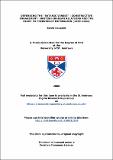Files in this item
Defending the “Satanic Verses” : constructive engagement: British-Iranian relations and the right to freedom of expression (1989-2004)
Item metadata
| dc.contributor.advisor | Hinnebusch, Raymond A. | |
| dc.contributor.author | Kaussler, Bernd | |
| dc.coverage.spatial | vi, 408 | en |
| dc.date.accessioned | 2008-10-24T14:24:02Z | |
| dc.date.available | 2008-10-24T14:24:02Z | |
| dc.date.issued | 2008 | |
| dc.identifier.uri | https://hdl.handle.net/10023/538 | |
| dc.description.abstract | This thesis aims to conceptualize what is often referred to in diplomacy, as a policy of “constructive engagement”, by employing neoliberal-institutionalist theories and conflict resolution approaches. The adopted “model for constructive engagement” serves as the theoretical framework and centres on the basic assumption that non-coercive diplomacy coupled with the offer of incentives is best suited at resolving conflict as well as promoting human rights in international relations. Rather than looking at determinants of foreign policy making, the thesis focuses, therefore, on the actual exercise of power and influence in international relations. As such, power, both in terms of a state’s available assets as well as seen as a form causation, is considered the crucial variable in determining diplomatic manoeuvring and negotiation behaviour. The empirical context for the research project is provided by the case of British-Iranian relations during the period from 1989 to 2004. The narrative is divided into two parts: the first one deals with the impact of the fatwa against Salman Rushdie by Ayatollah Khomeini on bilateral relations and investigates British diplomacy towards Tehran, which followed the European Union’s policy of “Critical Dialogue” with Iran. Whilst the promotion of human rights was on the agenda of the “Critical Dialogue”, findings indicate that contrary to other EU member states, most notably Germany, Whitehall was able to genuinely pursuing a policy of “constructive engagement”, demanding meaningful changes in Iranian behaviour. However, findings also show that Britain’s priority was at resolving the “Rushdie affair” and not necessarily at promoting and protecting human rights in Iran. The second part of the narrative looks at the “Comprehensive Dialogue” which was implemented by the European Union in 2000 and established a direct linkage between economic rewards and the improvements of human rights in Iran. Whilst the Iranian government and parliament met EU demands, the country’s maze of power centres, most notably those dominated by hardliners and conservatives, worked against any meaningful improvements in the protection and respect of human rights. Both narratives indicate to what extent diplomacy and negotiations were influenced by domestic constituents, referred to as the Two-Level Game, as well as by asymmetries of interdependence between the EU and Iran. Overall, the data implies that constructive engagement, whilst subject to political and economic interdependence, constitutes an effective form of human rights diplomacy. | en |
| dc.format.extent | 2130683 bytes | |
| dc.format.mimetype | application/pdf | |
| dc.language.iso | en | en |
| dc.publisher | University of St Andrews | |
| dc.rights | Creative Commons Attribution-NonCommercial-NoDerivs 3.0 Unported | |
| dc.rights.uri | http://creativecommons.org/licenses/by-nc-nd/3.0/ | |
| dc.subject.lcc | JZ1305.K2 | |
| dc.subject.lcsh | Diplomacy--Philosophy | en |
| dc.subject.lcsh | Conflict management | en |
| dc.subject.lcsh | Great Britain--Foreign relations--Iran | en |
| dc.subject.lcsh | Iran--Foreign relations--Great Britain | en |
| dc.subject.lcsh | Rushdie, Salman. Satanic verses | en |
| dc.title | Defending the “Satanic Verses” : constructive engagement: British-Iranian relations and the right to freedom of expression (1989-2004) | en |
| dc.type | Thesis | en |
| dc.type.qualificationlevel | Doctoral | en |
| dc.type.qualificationname | PhD Doctor of Philosophy | en |
| dc.publisher.institution | The University of St Andrews | en |
This item appears in the following Collection(s)
Except where otherwise noted within the work, this item's licence for re-use is described as Creative Commons Attribution-NonCommercial-NoDerivs 3.0 Unported
Items in the St Andrews Research Repository are protected by copyright, with all rights reserved, unless otherwise indicated.


